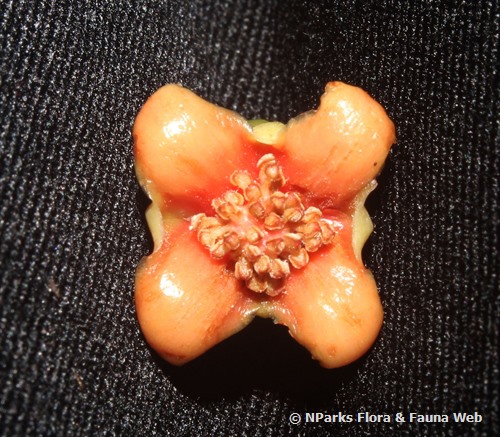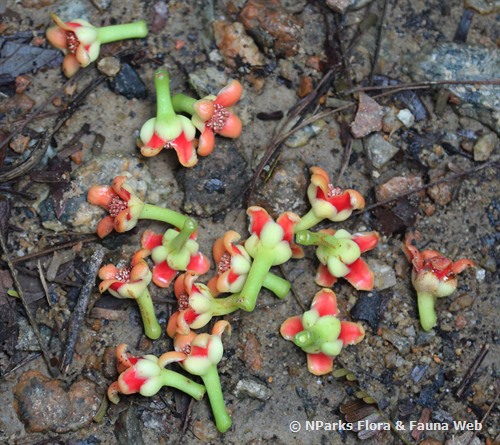
Name
Classifications and Characteristics
| Plant Growth Form | Tree |
|---|---|
| Plant Shape | Irregular |
| Maximum Height | 18 m |
Biogeography
| Native Distribution | Sumatra, Peninsular Malaysia, and Singapore |
|---|---|
| Native Habitat | Terrestrial |
| Preferred Climate Zone | Tropical |
| Local Conservation Status | Native to Singapore (Endangered (EN)) |
Description and Ethnobotany
| Growth Form | It is a dioecious species with separate male and female individuals. The tree up to 18 m tall. Its inner bark produces yellow latex. |
|---|---|
| Foliage | Its opposite, stalked leaves have thinly leathery leaf blades that are egg-shaped-elliptic with pointed tips and 7.6–19 by 3.2–8.9 cm. Its leaf margin is slightly curved backwards. Its parallel secondary leaf veins merge near the leaf margins to form an intramarginal vein. |
| Flowers | Its flowers are nocturnal and pungent, and its parts occur in fours. Its stalked, crimson male flowers are in clusters with individual flowers up to 6.3 mm across. Its red or orange female flowers are solitary and sessile. |
| Fruit | Its fleshy and sweet fruits are apple-like, measuring up to 8 cm across. The fruit base is deeply depressed. |
| Habitat | It grows in lowland and montane forests up to 1,700 m altitude. It occurs locally in Central Catchment Nature Reserve, Mandai, and Nee Soon Swamp Forest. |
| Associated Fauna | Its flowers are insect-pollinated. |
| Cultivation | It can be propagated by seed. |
| Etymology | Latin Garcinia, commemorating Laurent Garcin, a French botanist who travelled widely in India; Latin forbesii, commemorating H. O. Forbes, a British naturalist who explored the East |
| Ethnobotanical Uses | Edible Plant Parts : Edible Fruits Others: It is a source of timber. Its fruits are edible. |
Plant Care and Propagation
| Light Preference | Semi-Shade |
|---|---|
| Water Preference | Moderate Water |
| Plant Growth Rate | Moderate |
Foliar
| Mature Foliage Colour(s) | Green |
|---|---|
| Mature Foliage Texture(s) | Leathery |
Floral (Angiosperm)
| Flower Colour(s) | Orange, Red |
|---|
Fruit, Seed and Spore
| Mature Fruit Colour(s) | Purple, Red |
|---|
Image Repository
Others
| Master ID | 29903 |
|---|---|
| Species ID | 4212 |
| Flora Disclaimer | The information in this website has been compiled from reliable sources, such as reference works on medicinal plants. It is not a substitute for medical advice or treatment and NParks does not purport to provide any medical advice. Readers should always consult his/her physician before using or consuming a plant for medicinal purposes. |





